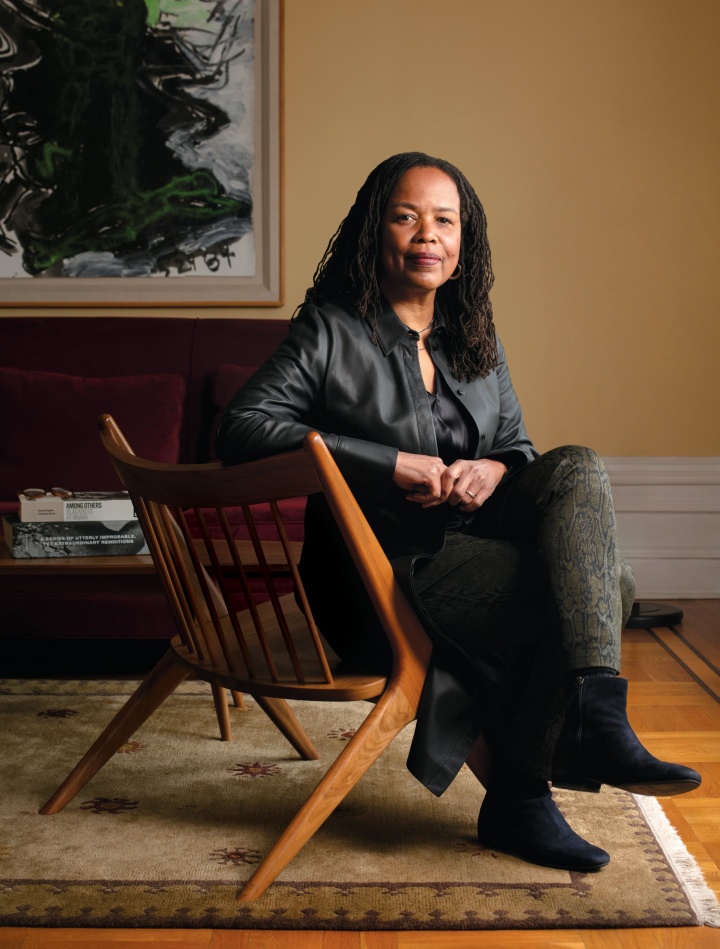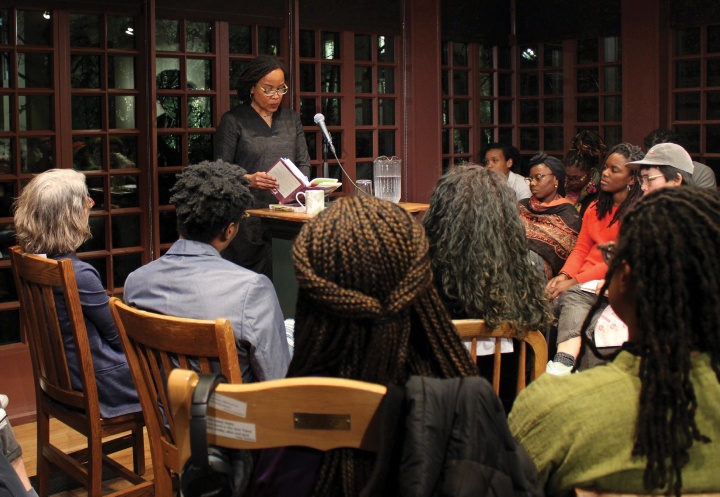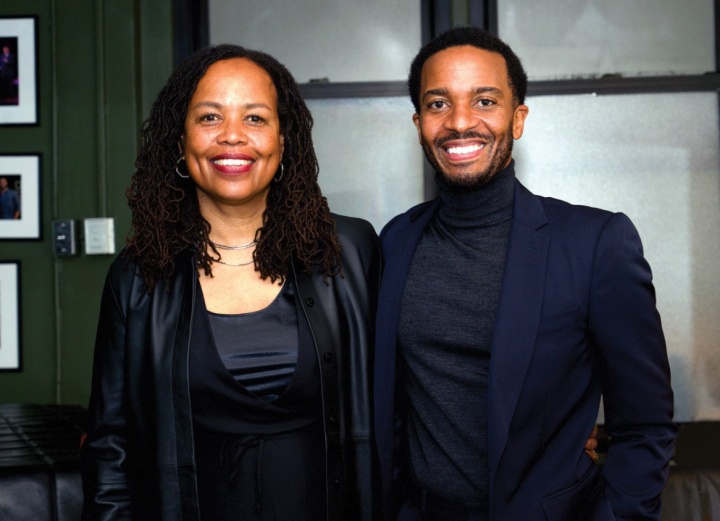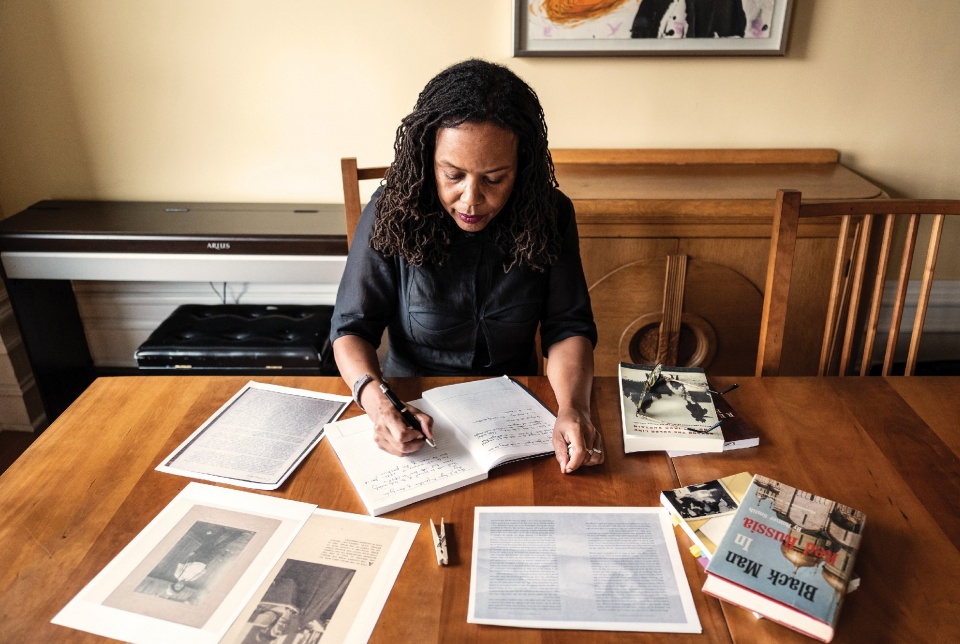University Professor Saidiya Hartman is telling the lost stories of Black Americans.
Columbia College | Columbia University in the City of New York
University Professor Saidiya Hartman is telling the lost stories of Black Americans.

Jörg Meyer
Hartman, a University Professor and a scholar of African-American and American literature and cultural history, has spent much of her career exploring the ways in which slavery and its aftermath still reverberate in modern American life. She has written three acclaimed books and dozens of essays, but it’s her approach that sets her apart: Employing a method she calls “critical fabulation,” Hartman uses scraps of archival material to create speculative narratives that tell the stories of slaves and their descendants. From a few impersonal lines written by a slave who’d been held captive in an African dungeon, Hartman conjures the terrified boy’s experience under unspeakable conditions. She imagines vibrant, immersive details about a woman seen only in shadow in a turn-of-the-century photograph, rectifying the prevailing cramped and ghettoized depictions of Black urban life after Emancipation. In this way, Hartman urges us to consider how history is recorded and by whom, and gives voice to essential points of view that have been lost or suppressed. It’s a process that Hartman says “troubles the line between history and the imagination.”
Hartman’s resuscitation and amplification of these stories challenge readers to consider the enduring effects of enslavement, and the ways that marginalization and violence toward Black Americans still exist in our society. (As I write this, Minneapolis police officer Derek Chauvin is on trial for the murder of George Floyd; 20-year-old Daunte Wright and 16-year-old Ma’Khia Bryant were killed by police not long after.)
Historian and law professor Annette Gordon-Reed thoughtfully discussed the “urgent moral dimension” of Hartman’s work when reviewing her most recent book, 2019’s Wayward Lives, Beautiful Experiments: Intimate Histories of Riotous Black Girls, Troublesome Women, and Queer Radicals. “Hartman’s efforts to tell the history of enslaved and Black Americans seem particularly timely as the United States reckons with the problem of systemic racism and inequality. As many people, historian or not, have asked: ‘How did we get here?’”
Wayward Lives went on to win a National Book Critics Circle Award (the announcement came the day the Covid-19 pandemic shut down the city last March) and PEN’s John Kenneth Galbraith Award for Non-fiction. It was the latest in a long list of accolades for Hartman: She was named a MacArthur Foundation “genius” in 2019, and has been a Guggenheim, Cullman, Fulbright, Rockefeller, Whitney Oates and University of California President’s fellow. Adjectives like “tremendously gifted” and “bravura” appear in her glowing book reviews. She has been the subject of a New Yorker profile and has appeared in a Jay-Z music video.
Hartman, a professor of English and comparative literature, has taught at Columbia since 2007. She was named a University Professor, Columbia’s highest faculty honor, in October.
“[Hartman’s] immersive and unflinching portraits of Black life have forever altered the ways in which we think and speak about enslavement and its invidious legacy in this country,” President Lee C. Bollinger said in his announcement of her appointment. “She brings a painstaking and unrelenting focus to retrieving and telling the lost stories of the dispossessed.”
In Hartman’s own words: “If the ghost of slavery still haunts our present, it’s because we are still looking for an exit from the prison.”
When we spoke by phone in March, Hartman explained that her interest in slavery was a quest handed down to her by her maternal great-grandfather Moses Thomas.
Hartman’s father was the son of Caribbean immigrants; he and his family “did not hanker after unnamed ancestors or wonder what might have been,” Hartman writes in the prologue of her 2007 book Lose Your Mother: A Journey Along the Atlantic Slave Route. But her mother grew up in segregated Alabama, her life proscribed by Jim Crow color lines; she and her family were activists in the Montgomery bus boycott. “My family background comprises the wayward and the elite, immigrants and strivers,” Hartman says.
As a child, Hartman had a basic awareness that slavery happened, though it hadn’t been discussed at her Brooklyn parochial school when she was growing up in the early 1970s, or at the Black Power summer camp she attended. (“The counselors taught us to disdain property, perform the Black Power handshake and march in strict formation, but they never mentioned the Middle Passage or chattel persons,” she writes.)
But slavery wasn’t abstract for Hartman; it was her ancestry. When she was 12 years old, her great-grandfather took her and her brother on drives around rural Montgomery and told them stories about his mother and grandmother, Ellen and Ella, who had been slaves. Hartman was eager to know more than her Poppa remembered or wanted to share, and became “obsessed” with trying to fill in missing details.

Hartman reads from Wayward Lives at Penn’s Kelly Writers House in February 2020.
KELLY WRITERS HOUSE
Her Yale dissertation became her first book, Scenes of Subjection: Terror, Slavery, and Self-Making in Nineteenth Century America (1997); since then, Hartman has been engaged with questions about the character of historical archives, and how what is found in them can shape — and limit — the kinds of stories we can tell.
Of paramount consideration is who actually recorded the data. For example, a vast slave narrative collection assembled by the Works Progress Administration in the early 20th century includes volumes of testimony that was produced under specific conditions, often white interviewers asking former slave owners or their children about their experience of slavery.
“There’s this radical asymmetry of power, but yet there’s a vast trove of stories and knowledge in these narratives,” Hartman says. “And I had to figure out how to navigate all of that to write a history of slavery against the grain, against the normative account and the prevailing assumptions about the life of the enslaved.”
Seeking a deeper understanding of the experience of enslavement, Hartman spent a formative year in Ghana as a Fulbright scholar in 1997, doing research about the Atlantic slave trade that would become Lose Your Mother. As both a professor and a descendant of the enslaved, she writes, “I was desperate to reclaim the dead, that is, to reckon with the lives undone and obliterated in the making of human commodities.” And yet she found next to no first-person experiences of the Middle Passage. “It was an intense encounter with archival silence,” she says.
Hartman fashioned her original method of storytelling from that silence; she first described it as “critical fabulation” in her 2008 essay Venus in Two Acts. Using what little information she found, she constructed narratives, written in the subjunctive — “a grammatical mood that expresses doubts, wishes and possibilities” — that gave personhood to human beings who’d overwhelmingly been relegated to line items.
“The intention here isn’t anything as miraculous as recovering the lives of the enslaved or redeeming the dead, but rather laboring to paint as full a picture of the lives of the captives as possible,” Hartman wrote. “The loss of stories sharpens the hunger for them. So it is tempting to fill in the gaps and to provide closure where there is none.”
She found next to no first-person experiences of the Middle Passage. “It was an intense encounter with archival silence,” she says.
Hartman utilized what existed in the archive but then extended it; in the wrenching chapter “The Dead Book” from Lose Your Mother, Hartman provides a horrific account of a young girl who was tortured and murdered on a slave ship by a British sea captain (he was tried and acquitted of the crime); she created it from only seven words that were actually written about her (“the dead negro girl,” and “a sulky bitch”). Hartman pored through legal transcripts, restaging statements and conflicting testimony she’d found in an effort to create a narrative of what unfolded on the ship. “I tried to find an opening or a rupture in which the experience of this young woman might emerge,” Hartman says. “It was rearranging those elements, reordering them, so they might build another kind of story.”
Giving voice to the unheard is a radically empathetic effort, and it has had its challenges. “It was really, really difficult to work in that archive, because there is so much violence and pain and loss and atrocity,” Hartman says. She did a reading of “The Dead Book” at Barnard shortly after Lose Your Mother was published, and was approached afterward by three elderly Black women who expressed concern for her well-being. “You know you can leave that ship, right?” one of them said.
“They were telling me this because they understood the psychic effect, the weight of having written that,” Hartman says. “They were trying to lead me out and back into the world.”
Hartman says she began her next book, Wayward Lives, as “a naïve attempt” to get some distance from that emotionally grueling project. “I was still carrying so much grief,” she says. “After a book has been produced and it’s out in the world, you still have to work through all that it took you to write it.”

Hartman with actor André Holland at the 92nd Street Y in April 2021; Holland read Hartman’s monologue, The End of White Supremacy: An American Romance.
NANCY CRAMPTON / 92Y
As she did in Lose Your Mother, Hartman creates speculative histories of real-life women from archival scraps — prejudicial notes of rent collectors; reports of vice investigators and social workers; police blotters — all of which represent these independent-minded women as a “problem.” Through her warm narration (the effect is like reading a beautifully written screenplay), Hartman offers these women humanity untethered by hostile judgment and classification; in doing so she offers an alternative perspective of the early 20th century — decades she says were especially decisive in determining the course of Black futures.
Perhaps in line with her unusual presentation, Wayward Lives won the National Book Critics Circle Award in the category of criticism, rather than fiction or nonfiction. (It also won the College’s 2020 Lionel Trilling Book Award.) And though her writing might exist in a gray area between fact and speculation, Hartman says the response has been largely respectful. “Historians feel the push and the transgression, but fortunately have still embraced the work,” she says. “I think that it’s been a critical and generous engagement.”
Hartman’s appointment as University Professor comes at a time when artistic activism around issues of racism and marginalization is a social and cultural imperative. “Artists who are not thinking about the relationship of their work to social transformation or the posing of critical questions about our Now — those are the rare birds,” she says.
Earlier in her career, Hartman says, she wanted to write more evocatively than was the norm in scholarly literature, but she was not encouraged. In a conversation with her friend the artist Arthur Jafa at Los Angeles’s Hammer Museum in June 2019, Hartman spoke frankly about being marginalized in her first teaching job and being taken aback by her colleagues’ low expectations of her. (But “within that space of no one taking me seriously, there was also all this space to work,” she said.) So it’s especially significant that she is the first Black woman to be honored with the highest rank at the University.
“I think the fact that I am the first says something about how difficult it has been for Black women in elite academies,” she says. “The intellectual landscape has changed some, and I feel very indebted to my colleagues, who have recognized the importance of my work and have supported it — that’s a huge part of what enabled this to happen.” Hartman also acknowledges her appointment in the context of the global Black Lives Matter movement, “the push of all that activism that was challenging the elitism of institutions like universities, art museums, the Hollywood studio system and imperial knowledge formation,” she says.

JOHN D. AND CATHERINE T. MACARTHUR FOUNDATION
“I love the classroom,” Hartman says. “I love the collective journey in exploring ideas and texts. I love the space of the seminar and the intimacy of thought that’s practiced there. Students have a safe space to share work, and we learn from one another.”
The love is mutual: Hartman is adored by her students and admired by her colleagues. “Saidiya Hartman is our generation’s most brilliant and innovative cultural theorist and cultural historian,” says Farah Jasmine Griffin, chair of the Department of African American and African Diaspora Studies and the William B. Ransford Professor of English and Comparative Literature. “Her work speaks to and informs multiple disciplines, including but not limited to literature, cultural studies, history, art history and much of the social sciences. Having known her since we were graduate students, I can testify that her promise was evident even then — she had all the hallmarks of an important and potentially groundbreaking intellectual.”
Hartman is currently on sabbatical at her home in Massachusetts (along with her partner, Samuel Miller, and their teenage daughter). She says she’s found it hard to work during the pandemic, especially since most archives have been closed (luckily she has archivists — “angels of the intellectual world” — who send copies of documents she needs). She’s at work on a new book, part fiction, part essay, about the lives of Black women intellectuals — “some cross between The Crisis of the Negro Intellectual and A Room of One’s Own,” she says.
Asked whether she sees herself as a radical, Hartman is modest. She says she feels “in very great company” with creative friends and collaborators who are producing work that is engaging the pressing issues of our time. But, somewhat unsurprisingly, she also places herself — and her University Professorship — in the context of history.
“It’s not my singular achievement that has solely opened any door,” Hartman says. “There have always been capable, creative, imaginative, brilliant Black people for whom the doors were closed because of the exclusions of the social order. So I feel I have benefited from centuries and decades of struggle. The University Professorship in a way is mine and in a way it belongs to a lot of people. I’m grateful for it.”

Published three times a year by Columbia College for alumni, students, faculty, parents and friends.
Columbia Alumni Center
622 W. 113th St., MC 4530, 6th Fl.
New York, NY 10025
212-851-7852
cct@columbia.edu

Columbia Alumni Center
622 W. 113th St., MC 4530, 4th Fl.
New York, NY 10025
212-851-7488
ccalumni@columbia.edu